April 28, 2024 | 03:02 GMT +7
April 28, 2024 | 03:02 GMT +7
Hotline: 0913.378.918
April 28, 2024 | 03:02 GMT +7
Hotline: 0913.378.918
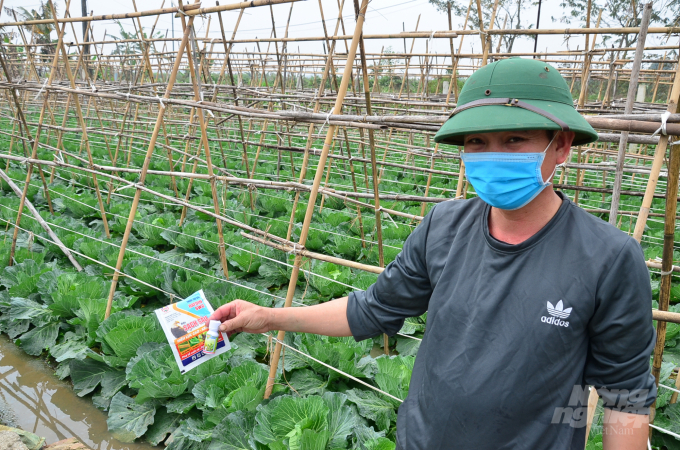
Le Van Hau, a 44 year-old farmer in Linh Thuong village (Yen Phu commune). Photo: Duong Dinh Tuong.
Yen Phu commune of Yen My district was a well-known vegetable-growing area of Hung Yen province, cultivating leafy greens on more than 3,000 hectares. Growing vegetable has become the main source of income for many families. Some of them have even got rich thanks to this job.
Le Van Hau, a 44 year-old farmer living in Linh Thuong village, Yen Phu commune was completely wrapped in dissolving pesticides made in both Vietnam and China in a 20-liter spray container next to a water tank. He said: "I take 20cc from each. Then, I mix them with a bottle of Chinese pesticide priced at VND18,000 per one." Without eye glass and protection gear, Hau use only a thin face mask while spraying the mixture.
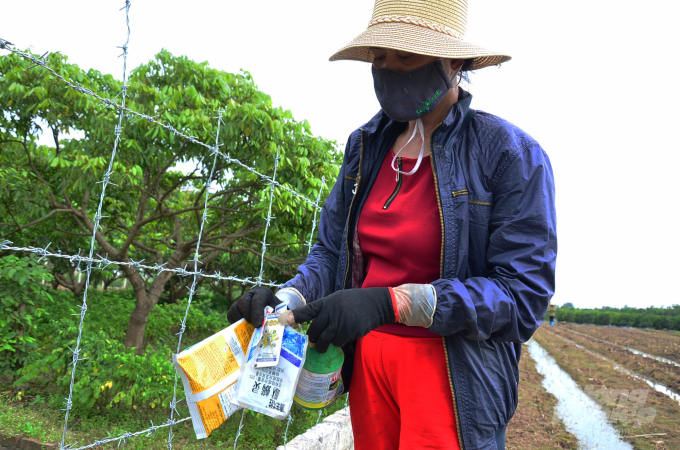
Le Thi San, a 41- year-old farmer in Me Ha village (Yen Phu commune). Photo: Duong Dinh Tuong.
Le Thi San, a 41- year-old farmer was harvesting her vegetables in Me Ha village, Yen Phu commune. Upturning the yellowed leaves showing the spots on them, San said: "This time of the year there are a lot of bugs. I must apply pesticide in the morning and in the afternoon, keep doing so for three days in a row. You can apply every 3-5 days if the bugs continue to occur."
San explained: "I often use Chinese pesticides in both big and small bottles. I have to mix Chinese pesticides with Vietnamese ones to kill insects."
Spraying pesticides on the flower fields in Van Giang district was men's work because it required a lot of effort. Meanwhile in the vegetable fields of Yen My district women were mostly involved in spraying pesticides. They carried 18-20-liter containers on their backs walking to every corner of the fields.
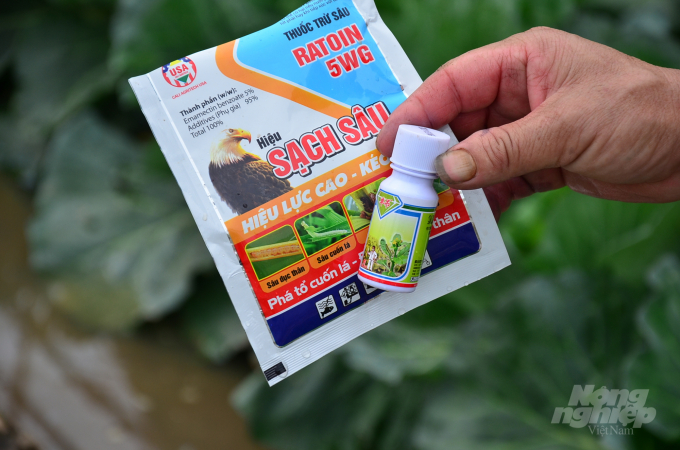
A bottle of pesticide made in China. Photo: Duong Dinh Tuong.
In a winter morning with drizzle, the officials of the Center of Agricultural Service of Tu Ky district (Hai Duong province) visited a vegetable-growing area in Nguyen Giap commune to inspect the use of illegal pesticide and herbicides. It was the end of the cropping season, farmers here were busy with harvesting and selling the remaining cabbages for cheap prices. In the next crop, they would grow watermelon. The empty pesticide containers were dumped by the fields of An Tho village.
Nearly ten used pesticide bottles could be seen in only a small area of the field. Most of them had Chinese characters on the labels without any Vietnamese sub-label or name of distributors. A farmer named Dong Viet Doan said:"I don't use pesticides made in China. Now, fewer people are using this kind of pesticide because it is ineffective and the local dealers no longer sell it. Vietnamese or Chinese pesticides, whatever they are, you must rotate between them to avoid pesticide resistance".
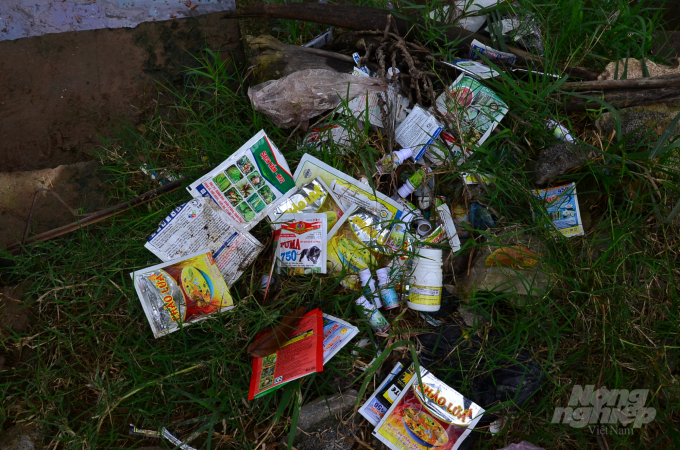
Empty pesticide bottles and bags are dumped by the field. Photo: Duong Dinh Tuong.
Another unnamed farmer said “We applied pesticides in uncontrolled way whenever we saw insects. We often acted on dealers’ advice. In the recent crop I grew cabbage turnips and I used Chinese pesticides. In this cropping season, I grow cabbages and I don’t apply Chinese pesticides. More and more farmers are now using bio-pesticides. However we still apply Chinese pesticides at least once per crop in case of massive insect invasions although we know it may be harmful to ourselves.”
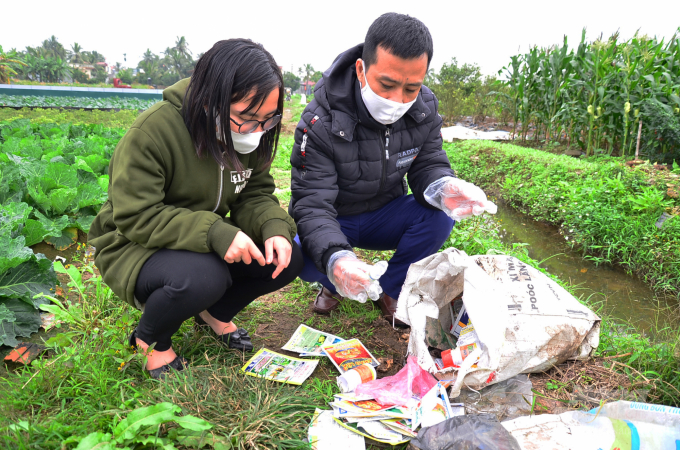
The officials of the Center of Agricultural Service of Tu Ky district looks at illegal pesticide bottles carefully. Photo: Duong Dinh Tuong.
Gia Xuyen commune, a vegetable-growing area of Hai Duong city, cultivated vegetables and crops on 150-170 hectares. In the fields of Tan Ha village, Vu Van Thuan said while collecting an empty pesticide container: “This type of pesticide was made in China priced at VND180,000/bottle and enough for 8 times of spraying.
Thuan's family had few saos of farming land (1 sao = 360 square meters), growing 2 cabbage crops and 1 corn crops every year. He said bio-pesticides were rarely used because they were only good at prevention but ineffective in case of insect outbreak. Next to Thuan’s cabbage farm, the blades of grass or leaves looked like to be burned by boiling water. “They sprayed herbicides. Because the field was full of weeds if we didn’t apply herbicides they would absorb all fertilizer. Today, no one has pulled weeds by hands. They have been using herbicides as a quick and effective way to kill weeds,” Thuan explained.
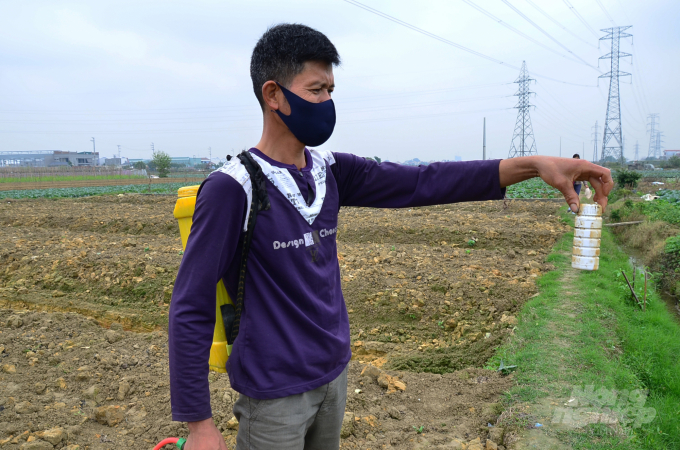
A Chinese pesticide bottle without label. Photo: Duong Dinh Tuong.
Most of the villagers no longer pulled weeds by hands as they used herbicides.The grass died up everywhere.
It was easy to find empty China pesticide bottles disposed by the fields. While in the concrete tanks built to store used pesticide and herbicide bottles and bags were full of them. After each use, farmers threw empty bottles and bags in the tanks, and then burned them out because they were not collected.
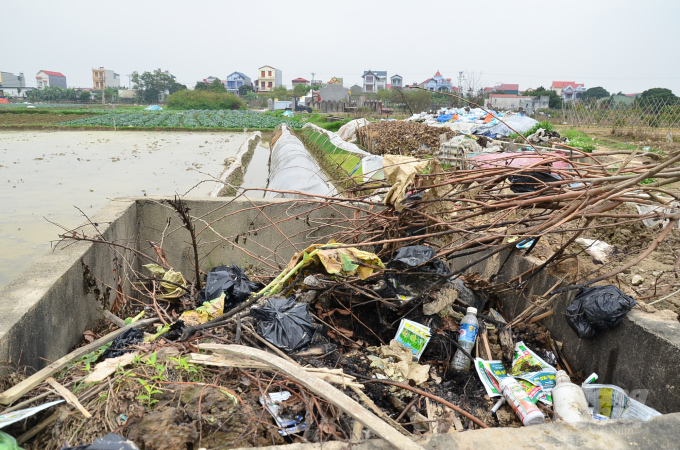
A tank storing empty pesticide bottles and bags in Gia Xuyen commune. Photo: Duong Dinh Tuong.
An unnamed woman said: “In my family, only my husband and I still work in the field. Neither of our children want to follow us because farming is hard work and harmful. In a moment, my husband will spray herbicide on our empty farmland over there to prepare for the next crop. He will also spray pesticide for our cabbage field. Herbicides or pesticides made in Vietnam are not so effective as those made in China. Although Chinese pesticides have strong and terrible smell if we don’t use them we can’t have vegetable to eat or to sell because there are a lot of insects and diseases attacking our crops.”
In the afternoon, more and more people poured into the fields to spray pesticides because active ingredients could avoid the sunlight and get more effective. A few moments later, dust from pesticides covered the fields, engulfed the farmers with heavy spray containers on their backs in choking smog.
Translated by Mai Tham
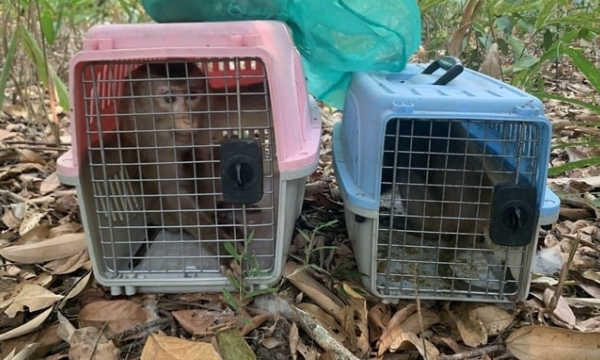
(VAN) After local residents voluntarily transfer them, the 3 pig-tailed macaques are cared for and in good health before being released back into the wild.

(VAN) Shortage of skilled and specialized human resources, incomplete production processes, and lack of methods to access the global market are common difficulties of the cinnamon industry.
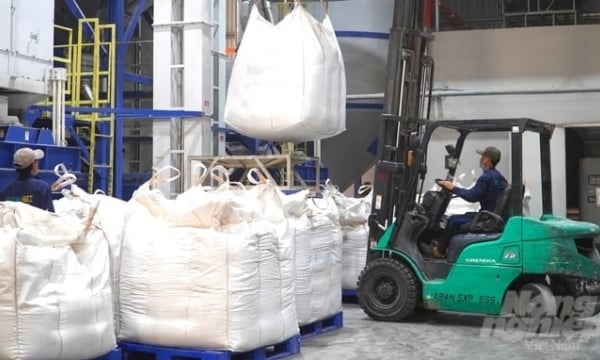
(VAN) In anticipation of a global shortage in rice supply, Vietnam is determined to restructure, enhance value, fulfill domestic consumption needs, and maintain a rice export volume of 7.4 million tons in 2024.
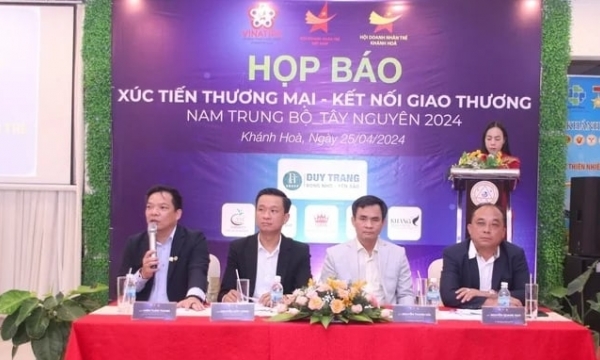
(VAN) The Trade Promotion and Connectivity Program between the South Central Coast and the Central Highlands in 2024 will be held in Nha Trang City on May 23
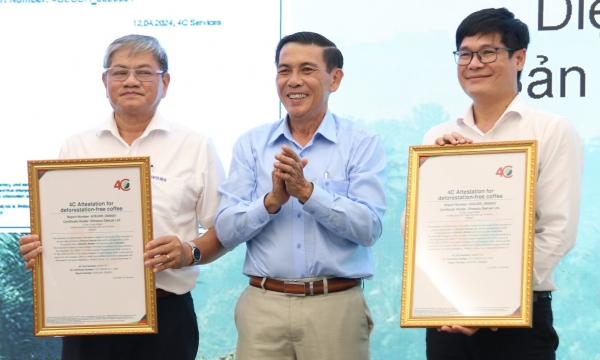
(VAN) Simexco DakLak has been approved for EUDR compliance, which includes 4,957 farmers and 5,375 hectares of production linkage areas.
/2024/04/26/0311-1-085026_641.jpg)
(VAN) The Ministry of Agriculture and Rural Development has just approved Project 'Sustainable Development of the Cassava Industry Until 2030, with a Vision to 2050' with an export target of USD 1.8–2 billion by 2030.
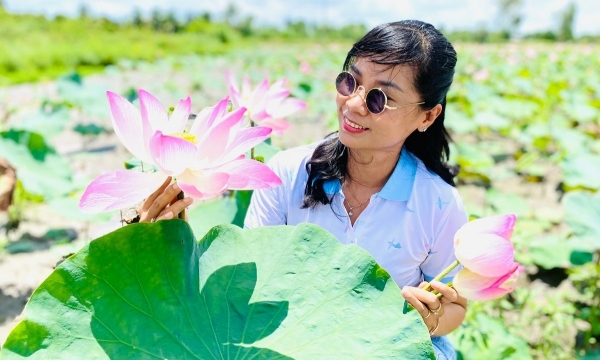
(VAN) The second Dong Thap Lotus Festival in 2024 attracts 66,000 lotus pots, with 57 lotus varieties that are beautifully arranged to create an interesting experience space.